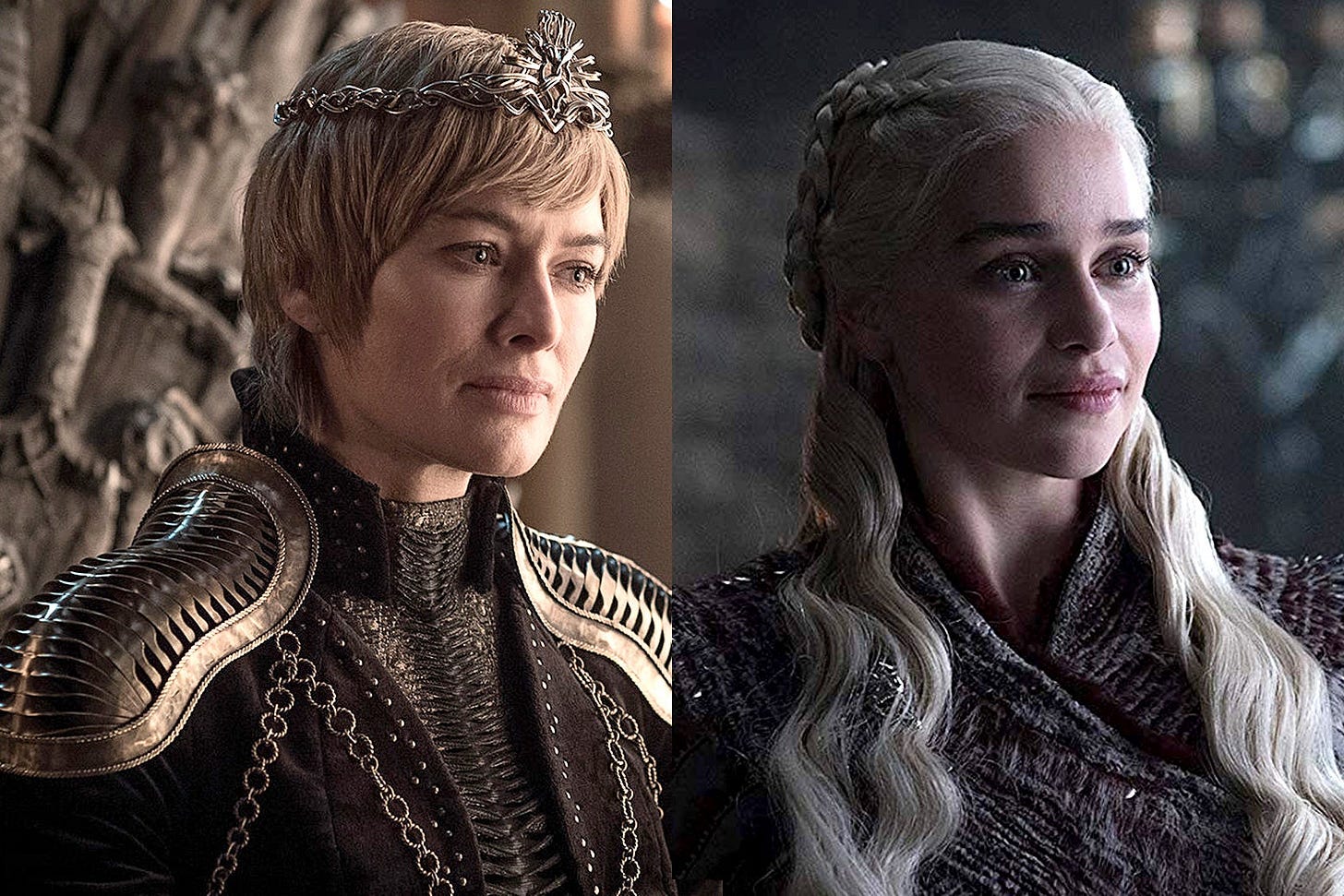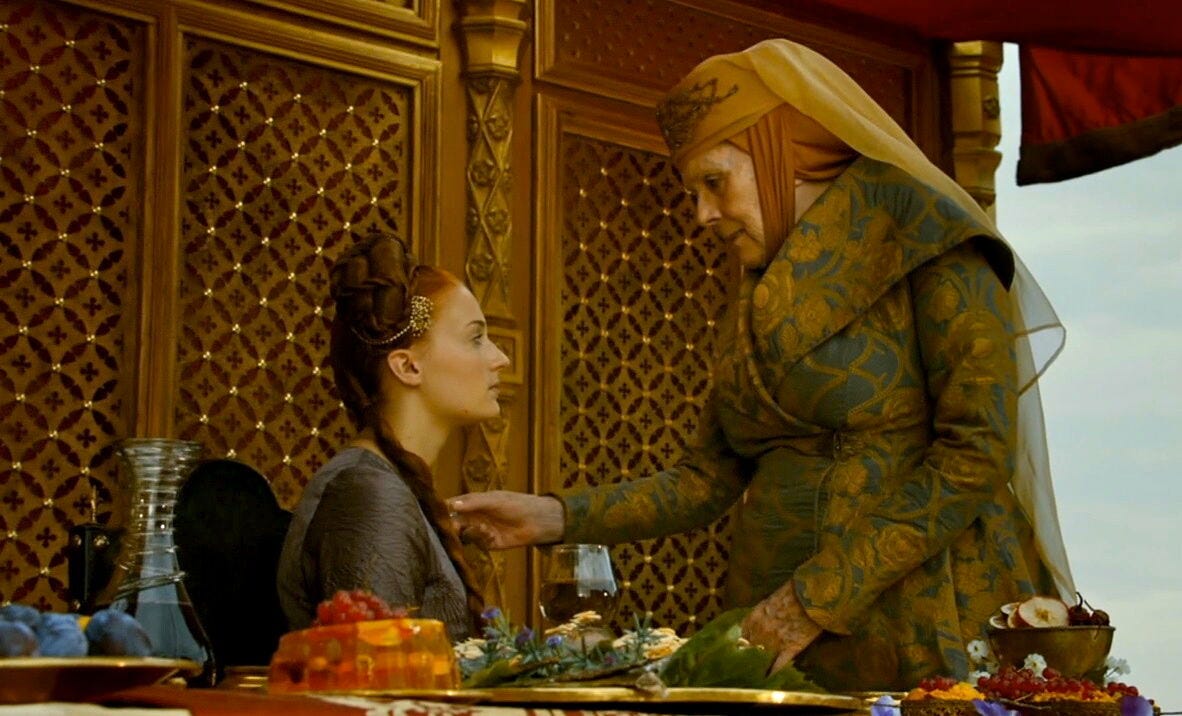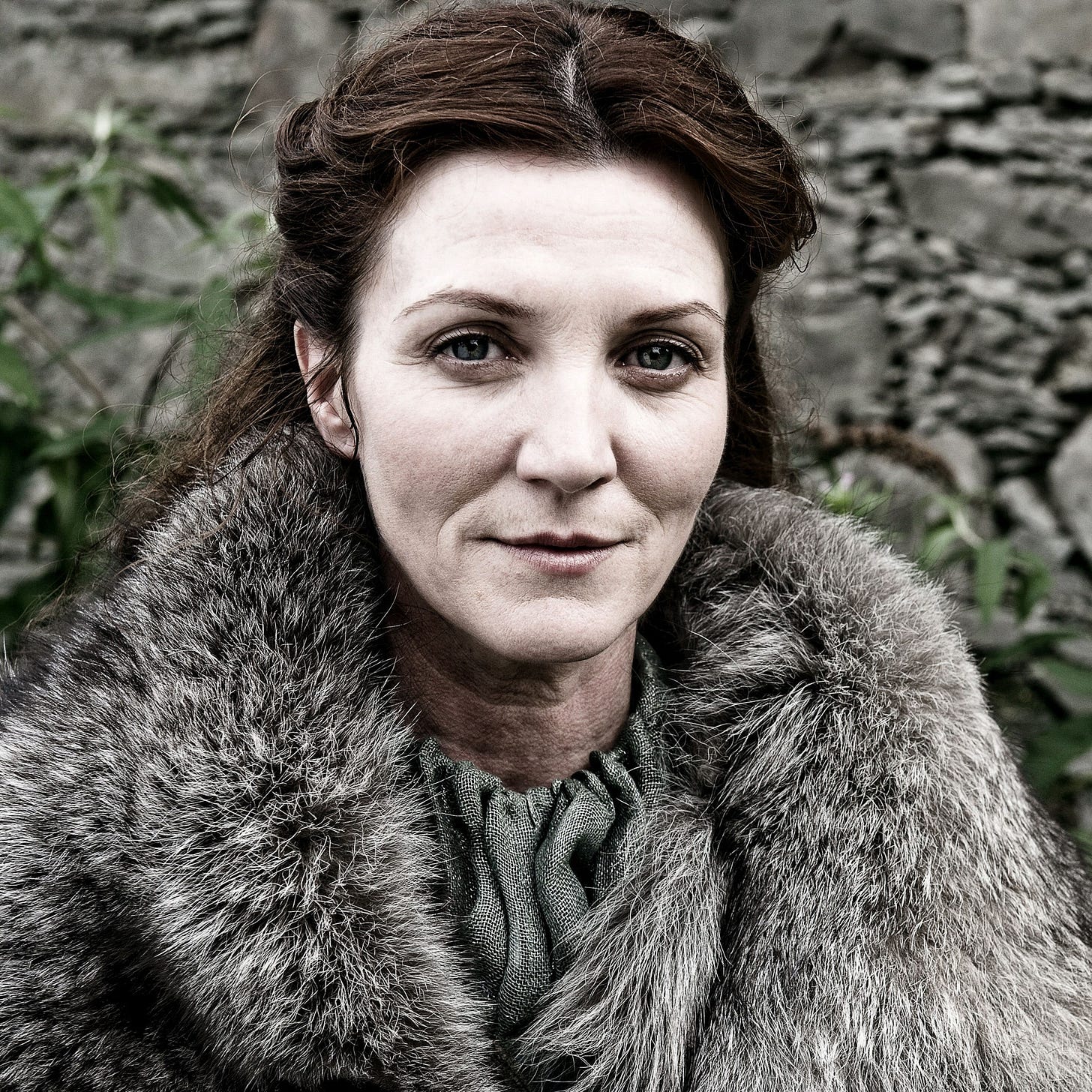Women, Power and Game of Thrones
What a show about incest, dragons and sister wives can teach you about power.
When I should be productive, I find that a malevolent force calls me towards whatever new URL for an illegal streaming site, and I make a bee-line for Game of Thrones. For a show full of incest, giants, dragons, magic, and sister wives, Game of Thrones at its core is a political drama. It is a show about great houses full of men and women doing whatever possible to advance their agendas. One of the reasons why I love this show so much is that it shows the different ways that women acquire, wield, and retain power. There are women like Daenerys who have nuclear weapons with wings, women like Cersei Lannister who have the wealth to buy an army and the ruthlessness to unleash them on the world, and women like Margaery who masterfully craft public perception to charm and disarm others. In a world where the main plotline was about the brutal, violent battle that men had for political power, there was a subplot that was often more interesting than the main one about how women advanced their own political desires. This essay is about Game of Thrones and what we as women can learn about Power from that show.
What is Power?
Power is the ability to manifest your will. It is the difference between being at the mercy of someone, and that person having the ability to force their will on you. But power is rarely as simple as pure force – it's a complex web of influence, resources, and relationships.
The root of all power in the external world is personal power. This is knowing who you are, what you have to offer the world, what you want from the world, and making all the forces align to get that thing. Power, and the games that we play to acquire and maintain it, are all around us. It is the mother who becomes friends with the dance instructor so that her daughter has preferential treatment, to the political marriages between people like Jared Kushner and Ivanka Trump. It's in every workplace promotion, every social media influence campaign, every PTA meeting.
In our modern world, power often wears a velvet glove – hidden behind politeness, procedure, and protocol. This is why Game of Thrones is so revealing: it strips away these pretenses. When Cersei Lannister says, "Power is power," she's cutting through the niceties to a fundamental truth. Yet even in Westeros, brute force alone is rarely enough. Look at how quickly Robert Baratheon's reign deteriorated despite his military victory, or how Daenerys had to learn that having dragons wasn't enough to rule effectively.
Power exists in many forms: institutional power (a title, a position), resource power (wealth, armies), social power (influence, reputation), and personal power (skills, charisma). What makes Game of Thrones so instructive is how it shows these forms of power interacting and competing. A queen with an army can be undone by a whispered secret. A highborn lady can be rendered powerless by public shame. A skilled manipulator can rise from nothing to sit on the Small Council.
So, what can we learn about Power from Game of Thrones? Let's break down the way that power is distributed in Game of Thrones.
Power manifests in Game of Thrones reveals a complex interplay between its source and how it's wielded. The women of Westeros demonstrate that power operates on two crucial axes: Traditional versus Personal power, and Overt versus Covert expression.
In the realm of Traditional-Overt power, we find Daenerys Targaryen and Cersei Lannister. These women command through established structures - birthright, wealth, and direct force. Daenerys's dragons are the ultimate expression of overt power, while Cersei weaponizes her Lannister heritage into armies and influence. Their power is impossible to ignore, but this visibility makes them vulnerable. As Cersei discovers repeatedly, obvious power attracts obvious challengers.

The Personal-Overt quadrant belongs to women like Brienne of Tarth and Yara Greyjoy, who forge their power through individual merit rather than inheritance. Their authority stems from demonstrated capability - Brienne's unmatched martial prowess, Yara's mastery of ships, and leadership. They operate in plain sight, but their power comes from what they've earned rather than what they were given. This makes their authority more respected but also more frequently challenged by those who resent power earned rather than inherited.
In the Traditional-Covert realm, we find Olenna Tyrell and the early evolution of Sansa Stark. These women utilize their high birth not as a weapon but as a foundation for subtle manipulation. Olenna masterfully plays the role of family matriarch while orchestrating political machinations from behind the scenes. Young Sansa learns to navigate court politics by appearing to be exactly what is expected of her - a proper lady - while gradually developing her own agency.
The Personal-Covert domain belongs to players like Melisandre and Shae, who accumulate influence through personal abilities rather than traditional authority. Melisandre converts religious authority and mystical power into political influence, while Shae leverages intimate relationships into protection and power. Their influence is entirely self-created but operates most effectively in the shadows.
At the intersection of these power dynamics stands Catelyn Stark, embodying a remarkable balance of all forms of power. She wields both the traditional authority of her position and her personal diplomatic abilities, knowing precisely when to invoke each. Her central position in this framework demonstrates that the most effective power often comes from the ability to adapt one's approach as circumstances demand.
The world of Game of Thrones strips away our modern pretenses about power, revealing its raw mechanics through the stories of women who master its use. From Daenerys with her dragons to Sansa learning the subtle arts of influence, each woman's journey teaches us something vital about how power is built, wielded, and maintained.
In the essays that follow, we'll examine these lessons in detail. We'll start with how to build your foundation of power, as Daenerys did from exile to conquest. We'll study how to play the game to win, learning from Olenna Tyrell's decades of political maneuvering. Through Margaery's masterful manipulation of public perception and private relationships, we'll explore how to master people. We'll examine how Cersei and Sansa learned to control dynamic situations, even as the ground shifted beneath their feet. Finally, we'll study the delicate art of knowing when to dazzle and when to disarm – a lesson that separated the survivors from those who lost their heads.
Ultimately, that's what Game of Thrones teaches us about power: it's not enough to have it. You must understand its nature, master its use, and most importantly, know which weapon to wield at which moment. The Game of Thrones never truly ends – it just moves from Westeros to our own world of boardrooms, relationships, and everyday battles for influence.
Before we dive into each aspect of power in the coming essays, I want to hear from you. Who is your favorite character in Game of Thrones, and what do they teach you about power? Are you drawn to Daenerys's revolutionary force, Olenna's masterful subtlety, Cersei's ruthless determination, or Sansa's careful evolution? Your answer might reveal more than you think about how you view power and its use in your own life.
In the end, while Game of Thrones might be a show about dragons and magic, its true power lies in showing us reflections of ourselves – in both the power we wield and the power we wish we had.
In the words of Cersei Lannister, "When you play the Game of Thrones, you win or you die." Let's learn how to win.
Best,
Coffy.
God does not need your help
Of the many predilections that plague me – from a crippling coffee addiction to an obsession with Roger Federer that might land me in an asylum - there is one affliction that's harder to name. It's the cognitive dissonance of believing that divine providence has chosen me for a great mission while simultaneously cushioning my aspirations to avoid disapp…













https://www.youtube.com/watch?v=X1MZzMq1UzA